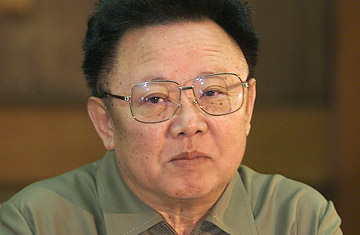
North Korean Leader Kim Jong Il
Back in early 2002, George Bush called North Korea a charter member of the axis of evil. This morning, the President gave Kim Jong Il one of the diplomatic plums the North Korean dictator has most sought: removal from both the State Sponsors of Terrorism list and the Trading with the Enemy Act. In short, Pyongyang is now off what one State Department official called "the ultimate bad guy list." Dropping North Korea from the terrorism roster will take effect 45 days after the Administration formally informs Congress of its decision.
The Administration is giving Kim what he wants because it is getting, at long last, a full accounting from Pyongyang of the North's nuclear activities, which Kim was supposed to supply at the end of last year as part of an agreement North Korea signed in the so-called six-party talks. Pyongyang handed over that accounting to the Chinese government on Thursday morning.
Critics of the ongoing nuclear diplomacy immediately pounced, declaring that the U.S. was appeasing the North Korean dictatorship. "In effect it's the first act of the Obama presidency," says former U.S. Ambassador to the United Nations John Bolton. "We've given them pure gold [by removing them from the TWEA and State Sponsors of Terror lists] and in return they've given us a piece of paper, which we have no means of verifying." Skeptics don't believe that the North will come clean in the material handed over Thursday about its alleged uranium enrichment program. In late 2002, the U.S. accused Pyongyang of hiding just such a program, an allegation that led to the North pulling out of talks and ultimately testing its nuke in October of 2006. It's also doubtful that Pyongyang will say anything about its apparent involvement in the construction of a nuclear reactor in Syria, which Israel bombed and destroyed in a bombing raid last September.
Still, State department negotiators defend the U.S. move. They argue — and the dreary U.S. diplomatic history with North Korea bears this out — that Pyongyang simply doesn't move if it feels its negotiating partner isn't living up to its promises. In early 2007, for example, the U.S. agreed, over its own Treasury Department's objections, to unfreeze millions of dollars of North Korean assets then held in a bank in Macau. Once it did so, North Korea slowly began dismantling its nuclear reactor at Yongbyan, which provided the plutonium for the 8 to 16 nuclear bombs U.S. intelligence agencies now believe North Korea has — including the nuke it tested in October of 2007. On Friday, June 27, Pyongyang says it will blow up the cooling tower of the nuclear facility at Yongbyan — the most visible symbol of North Korea's nuclear program.
It's clear that President Bush has given his State Department marching orders to give the North what it wants, when it wants it — providing Pyongyang then delivers on the nuclear agreement. "Action for action," President Bush called this in a statement on Thursday. Secretary of State Condoleezza Rice, in a piece in Thursday's Wall Street Journal aimed at pre-empting critics of the deal, wrote: "We will not accept [Pyongyang's] statement on faith. We will insist on verification." That, however, could plausibly be the next stumbling block with Pyongyang, since nothing in the agreements North Korea has signed at the six-party talks says anything about how exactly its compliance will be verified.
The U.S. and its diplomatic partners (China, Japan, South Korea and Russia) will have 45 days to review Pyongyang's declaration. Going forward, a key question remains: even if it destroys the reactor at Yongbyan, will the North say where it is keeping the nukes that it has already built? Will it reveal where the fabrication of its nuclear weapons took place, since it is clear it was not at Yongbyan? And what about the site of the October 2006 nuclear test? Will the U.S. and its partners insist that that be dismantled?
Nevertheless, Bush Administration officials argue, with some justification, that this week's episode in the negotiations is big victory for their diplomacy with the North. "There's no question that the end of Yongbyan is significant," says Ralph Cossa, President of the Pacific Forum, a think tank affiliated with the Center for Strategic and International Studies. It eliminates the source of the plutonium that Kim has used to build his bombs.
For its part, North Korea now wants the U.S., Japan and South Korea to make good on promises to build a light water reactor for energy generation. The U.S. promised this in 1994 — in the so-called agreed framework under President Clinton — and it has been held out as one of the incentives in the more recent six-party talks. But Washington has been deliberately coy about when the North might expect to actually get assistance on a peaceful nuclear project — "basically, the message has been, when hell freezes over," says Cossa. But with North Korea having been officially taken off the bad guy list, this is likely to be the next item on Kim Jong Il's wish list. And it will probably be either Barack Obama or John McCain who decides whether to grant his wish.
